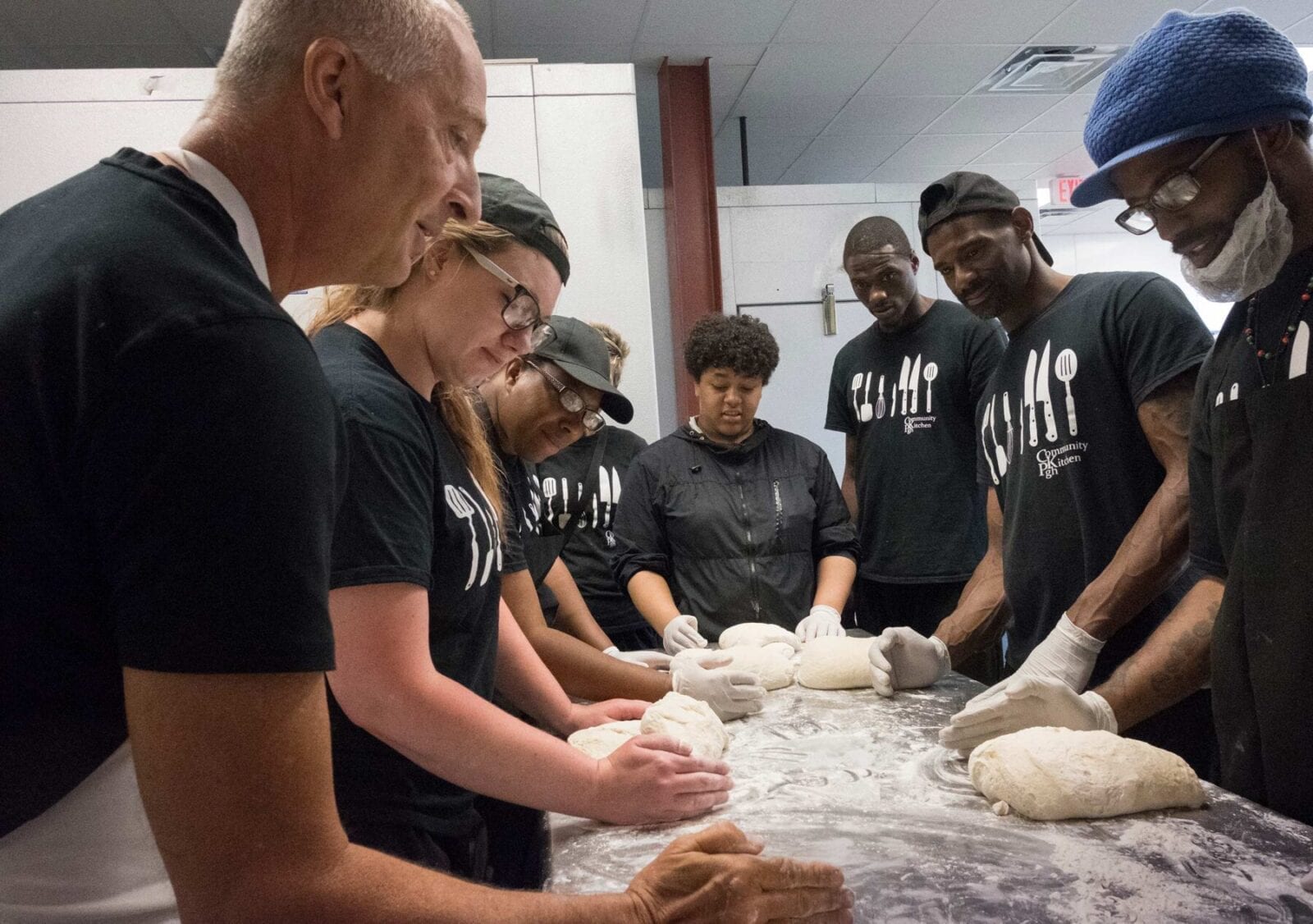Expecting more than $1 billion in opioid settlement money, Pa. grapples with policing versus treatment
By Ed Mahon of Spotlight PA and Kate Giammarise of WESA

In this fall 2019 photo, guest chef Larry Lagattuta demonstrates how to work with bread dough to students in Community Kitchen's culinary training program. The state Department of Human Services supports program, based in Hazelwood, which offers job training to those facing employment challenges in the Pittsburgh region. (Photo/Heather Mull)
The Pennsylvania Department of Human Services is a frontline agency for emergency assistance, but job training also plays a role
~By Sponsored
A job is more than an identity, and a way to earn money to support yourself. A person’s job — or lack thereof — can affect mental and physical health.
But often there’s barriers to getting a job. Maybe it’s education. Or even transportation.
In Episode 3, host Ellen Beckjord talks to Teresa Miller, secretary of the Pennsylvania Department of Human Services. The agency, with a $40 million annual budget, administers public assistance, childcare, long-term care, behavioral health, and more. Most people in the state will interact with the agency at some point in their lifetime to access services.
Miller has focused on collaborating with other agencies to advance Gov. Tom Wolf’s health innovation and workforce development agendas. Read part of the conversation, here, then listen to the entire podcast.
One of the initiatives that you’ve put a lot of momentum behind is employment. Could you talk a little bit about your views on employment in the realm of social determinants of health?
If we want our healthcare system to be effective, we need to see people for who they are and what they experienced throughout their lives, not just who they are when they present in that doctor’s office or in that healthcare setting.
This pandemic has laid bare the serious inequities that persist in Pennsylvania and around the country and the precarious situations so many people live in.
Teresa Miller has served as Secretary of the Department of Human Services since 2017. During that time, she's worked to focus on collaborating across agencies to advance Gov. Tom Wolf's health innovation and workforce development agendas, overseeing the launch of managed care for long-term care services, and supporting efforts to address social determinants of health such as food security and housing. Prior to leading DHS, Miller served as Pennsylvania’s Insurance Commissioner. Before coming to Pennsylvania, Miller held positions at the federal Centers for Medicare and Medicaid Services, where she worked on implementation of the Affordable Care Act. Miller also previously served as the administrator of the Oregon Insurance Division.
If a person is having adverse outcomes that indicate that they have stress or trauma in their lives, how can we help overcome that?
A work requirement is a really blunt instrument. It doesn’t get a person a job. It doesn’t address the social and educational and environmental barriers that keep people in that cycle of poverty. Instead, it jeopardizes their access to healthcare and other essential needs.
So that’s why we started looking at our programs to say, how can we do a better job of helping people navigate and overcome the barriers they’re facing and achieve their education, their training, their employing the goals, and help them get to living wage jobs and help them transition off of public assistance for the long term. That’s really been our focus.
How are you thinking about meeting the needs of individuals who are perhaps for the first time are facing social determinant issues, food security, housing, security, employment security?
The circumstances that people are living through right now make everything we just talked about so much more important and critical because this pandemic has laid bare the serious inequities that persist in Pennsylvania and around the country and the precarious situations so many people live in.
I know sometimes people can be hesitant to apply for public assistance programs, but I want to remind people, what we are facing now is exactly why these programs exist.
We are here to ease difficult times and ensure that people can meet basic needs, but like being able to go to the doctor and having enough to eat, and if we’re able to help people who’ve lost income or help them get a lead on a new job or help them pursue a new field, I think that’s a bonus.
Listen to the rest of the conversation on the Good World, Better Health podcast.
Learn more about programs through the Pennsylvania Department of Human Services.
If you’re interested in learning more about the employment programs available through Pathways to Work, a workforce development program by the UPMC Center for Social Impact, please visit here, email us at pathwaystowork@upmc.edu, or call us at 1-833-526-6271. (TTY: 711)
Delivered weekly to your inbox. Listen. Learn. Take action.
By Ed Mahon of Spotlight PA and Kate Giammarise of WESA
By Danielle Oil and Brittany Hailer, Spotlight PA and the Pittsburgh Institute for Nonprofit Journalism
By Natasha Lindstrom
By Angela Couloumbis of Spotlight PA and Kate Huangpu of Spotlight PA
Welcome to Postindustrial, a multimedia company that’s redefining the Rust Belt on our own terms through stories, podcasts, and more. Sign up here for free updates!